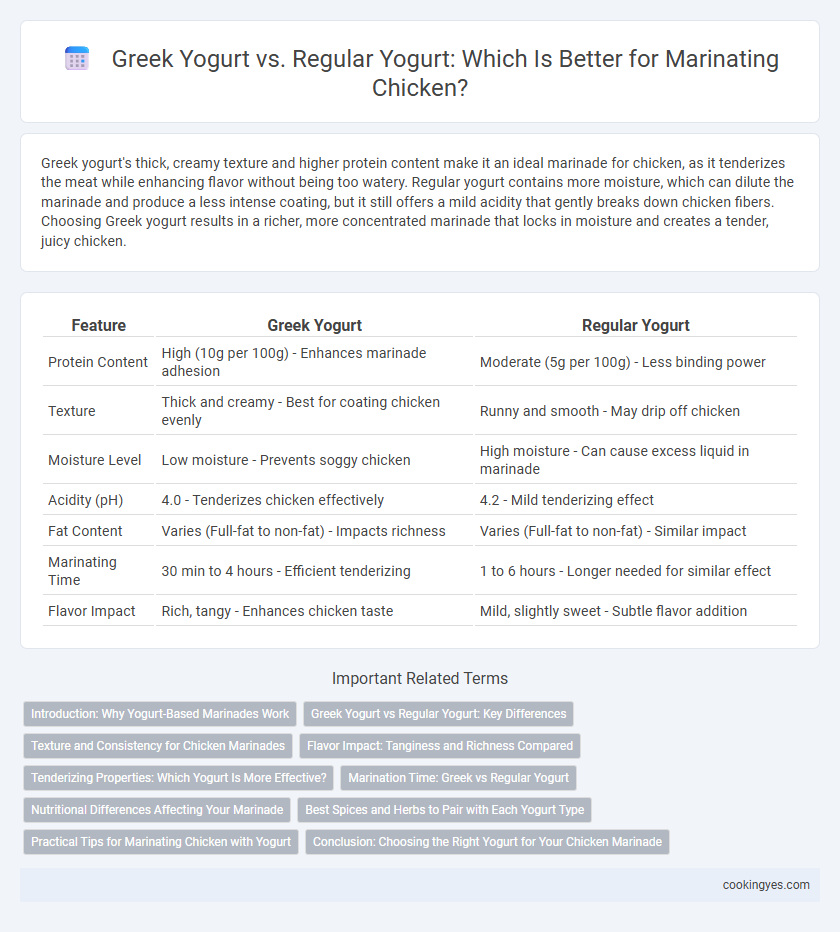Greek yogurt's thick, creamy texture and higher protein content make it an ideal marinade for chicken, as it tenderizes the meat while enhancing flavor without being too watery. Regular yogurt contains more moisture, which can dilute the marinade and produce a less intense coating, but it still offers a mild acidity that gently breaks down chicken fibers. Choosing Greek yogurt results in a richer, more concentrated marinade that locks in moisture and creates a tender, juicy chicken.
Table of Comparison
| Feature | Greek Yogurt | Regular Yogurt |
|---|---|---|
| Protein Content | High (10g per 100g) - Enhances marinade adhesion | Moderate (5g per 100g) - Less binding power |
| Texture | Thick and creamy - Best for coating chicken evenly | Runny and smooth - May drip off chicken |
| Moisture Level | Low moisture - Prevents soggy chicken | High moisture - Can cause excess liquid in marinade |
| Acidity (pH) | 4.0 - Tenderizes chicken effectively | 4.2 - Mild tenderizing effect |
| Fat Content | Varies (Full-fat to non-fat) - Impacts richness | Varies (Full-fat to non-fat) - Similar impact |
| Marinating Time | 30 min to 4 hours - Efficient tenderizing | 1 to 6 hours - Longer needed for similar effect |
| Flavor Impact | Rich, tangy - Enhances chicken taste | Mild, slightly sweet - Subtle flavor addition |
Introduction: Why Yogurt-Based Marinades Work
Yogurt-based marinades are highly effective for marinating chicken due to their natural acidity and enzymatic properties, which tenderize the meat by breaking down protein structures. Greek yogurt, with its thicker consistency and higher protein content, clings better to chicken, enhancing flavor absorption and moisture retention during cooking. Regular yogurt contains more whey and less protein, resulting in a thinner marinade that still tenderizes but may provide less pronounced texture and flavor benefits.
Greek Yogurt vs Regular Yogurt: Key Differences
Greek yogurt contains higher protein content and thicker consistency compared to regular yogurt, making it ideal for marinating chicken as it adheres better and tenderizes the meat effectively. Regular yogurt has a thinner texture and lower protein levels, resulting in a lighter marinade but less coating ability. The acidity level in both is similar, providing the necessary enzyme activity to break down proteins and enhance chicken flavor.
Texture and Consistency for Chicken Marinades
Greek yogurt, with its thick and creamy texture, clings better to chicken, providing an even coating that enhances moisture retention during cooking. Regular yogurt's thinner consistency allows it to penetrate more deeply, tenderizing the meat effectively but with a less substantial coating. For marinating chicken, Greek yogurt creates a rich, velvety marinade ideal for a firmer crust, while regular yogurt offers a lighter marinade that soaks into the fibers for tender results.
Flavor Impact: Tanginess and Richness Compared
Greek yogurt imparts a thicker, creamier coating to chicken, enhancing tenderness through its higher protein content and concentration. Its tanginess is more pronounced than regular yogurt, providing a robust flavor that penetrates the meat deeply for a vibrant taste profile. Regular yogurt offers a milder tang and lighter texture, resulting in a subtler flavor impact while still tenderizing the chicken effectively.
Tenderizing Properties: Which Yogurt Is More Effective?
Greek yogurt contains higher protein content and lower moisture compared to regular yogurt, intensifying its tenderizing effect on chicken by breaking down muscle fibers more efficiently. The thicker consistency of Greek yogurt ensures better adhesion to the chicken surface, enhancing marinade absorption and flavor penetration. Regular yogurt's higher water content can dilute marinade potency, making Greek yogurt the preferred choice for achieving tender, juicy chicken.
Marination Time: Greek vs Regular Yogurt
Greek yogurt requires less marination time than regular yogurt due to its thicker texture and higher protein content, which enhances enzyme activity and tenderizes chicken more efficiently. Regular yogurt, with its higher moisture content and milder acidity, generally needs longer marination to break down proteins and infuse flavor thoroughly. Opting for Greek yogurt can reduce marination from 6-8 hours typical of regular yogurt to as little as 2-4 hours while still achieving a tender, flavorful chicken.
Nutritional Differences Affecting Your Marinade
Greek yogurt contains higher protein content and thicker texture compared to regular yogurt, enhancing its ability to tenderize chicken more effectively during marination. The lower sugar and carbohydrate levels in Greek yogurt reduce the risk of burning when grilling, resulting in a better crust formation. Regular yogurt's higher moisture content can lead to a lighter marinade but may require longer marinating time to achieve the same tenderizing effect.
Best Spices and Herbs to Pair with Each Yogurt Type
Greek yogurt's thick texture and tangy flavor pair well with robust spices such as smoked paprika, cumin, and garlic, enhancing chicken's savoriness while tenderizing the meat effectively. Regular yogurt's lighter consistency complements delicate herbs like oregano, thyme, and dill, imparting subtle aromatic notes and a mild tang that tenderizes without overpowering. Incorporating lemon zest or crushed red pepper flakes with either yogurt type can elevate the marinade's complexity and intensify the final dish's flavor profile.
Practical Tips for Marinating Chicken with Yogurt
Greek yogurt's thick consistency clings better to chicken, ensuring even coating and enhanced flavor absorption during marination. Regular yogurt's higher water content may require longer marination times to achieve similar tenderizing effects. For optimal results, marinate chicken with Greek yogurt for at least 2 hours, using spices and acidic ingredients like lemon juice to boost moisture retention and flavor penetration.
Conclusion: Choosing the Right Yogurt for Your Chicken Marinade
Greek yogurt's thick consistency and higher protein content make it ideal for marinating chicken, as it clings better and tenderizes meat more effectively. Regular yogurt, with its lighter texture and higher moisture, can still be used but may require longer marinating times to achieve similar tenderness. Selecting Greek yogurt enhances flavor absorption and results in juicier, more flavorful chicken due to its balanced acidity and creaminess.
Greek yogurt vs regular yogurt for marinating chicken Infographic

 cookingyes.com
cookingyes.com